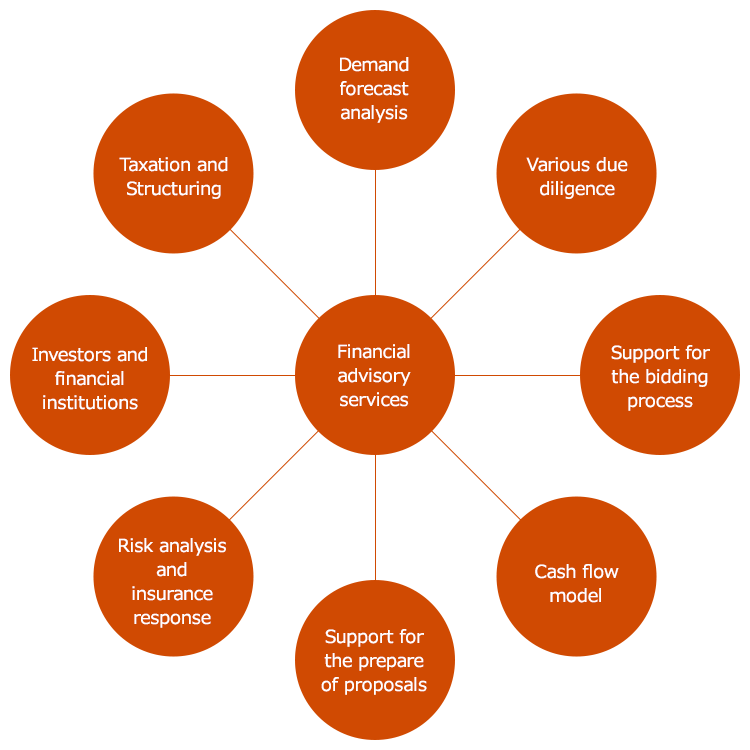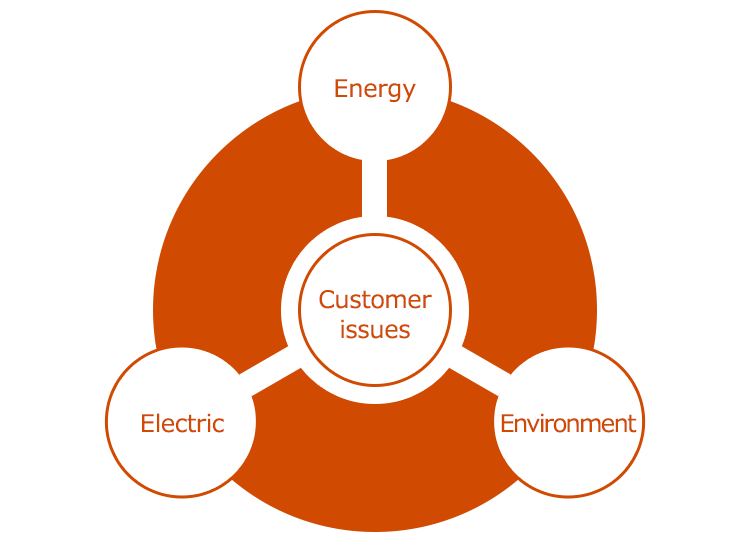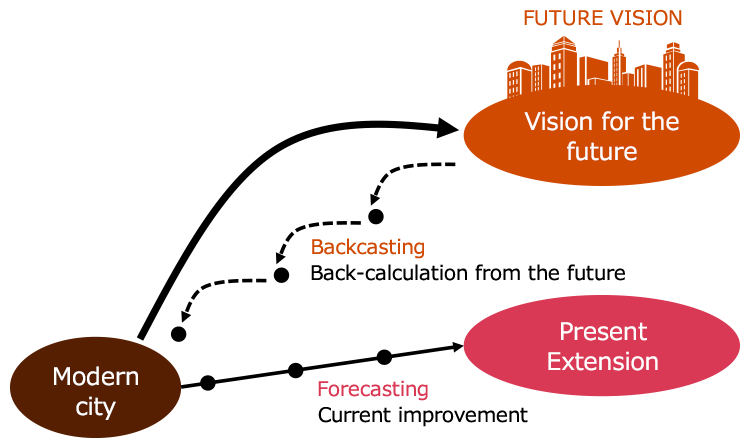{{item.title}}
{{item.text}}

Download PDF - {{item.damSize}}
{{item.text}}
In recent years, with the introduction of concessions and the liberalization of the electric power industry, the infrastructure business has been required not only to deal with institutional risks but also to deal with market risks, and both the public and private sectors are required to design infrastructure business systems and evaluate projects, including demand forecasts and price forecasts.
For more than 20 years, PwC's Infrastructure and PPP department has provided a variety of infrastructure and PPP services to both the public and private sectors since it began pioneering the introduction of PFI in Japan. In a wide range of areas, both in Japan and overseas, both public and private sectors, more than 60 staff with expertise in infrastructure will respond to diverse needs and provide services tailored to the needs of the times.
Utilizing our long experience of advising a variety of clients since the enactment of the PFI Law, considers will provide various types of public services, including not only airports, water supply and sewerage systems, but also sports, educational facilities such as stadium and arena, public facilities such as government buildings and hospitals, as well as infrastructure facilities such as ports, roads, transportation, and parks. We will also provide various kinds of due diligence services (business DD, financial DD, asset DD, etc.) to support the introduction of PFI/PPP Concession Methods, feasibility studies, procurement support, such as the selection of business operators, and advisory services such as post-project monitoring.
The concession market in Japan continues to expand to a wide range of areas, starting with airports, including toll roads, sewage systems, exhibition centers, gymnasiums, museums, and hydroelectric power.
PwC provides information to support private businesses determine the human resources and budgets they need, as well as the future potential of the business itself, through market analysis when they enter concession projects, market size and prospects estimation, market positioning analysis, public service needs and response policies, and actual strategy formulation.
In addition, as an advisor on actual bidding, we have established a system that enables us to provide almost all of our services in a one-stop fashion, from forecasting demand to contract and executing loan agreements.
The concession market in Japan is also expanding in areas such as airports and sewage systems, which require relatively large-scale project financing.
PwC has consulting experience in both the public service and private sectors. For example, PwC can provide advice based on past experience regarding outstanding issues business to investment and financing, such as project financing, contractual risks, market risks, force schedule handling, and insurance coverage when considering investment as a mezzanine provider. As a bidding advisor, we have developed a system that enables us to provide high-quality advisory services from the perspective of investors, based on our experience in arranging from demand forecasting to concluding business contracts and loan agreements.
In addition to improvement existing public services, cooperation between the public and private sectors is indispensable for resolving the various new social challenges that arise in today's rapidly and drastically changing societies, such as the advance of globalization, the increase in inbound demand, and changes in the social structure that accompany the aging society with a declining birthrate. The government will support the construct of a public-private partnership framework that makes effective use of the knowledge and know-how of both the public and private sectors in order to create a sustainable, affluent and flexible society in the future, as well as existing solutions such as the introduction of private-sector participation in public services and the effective use of public assets (PRE), in response to the challenges facing various administrative organizations such as the national government and local governments (prefectures, municipalities, etc.).
In order for Japanese entities to survive in the infrastructure market in emerging countries, where competition is intensifying and the environment is changing dramatically, it is necessary to formulate plans and formulate specific projects, starting with creating an environment in which Japanese companies can demonstrate their competitiveness. In the bidding and propose of individual businesses, it is essential to proceed on the basis of careful consideration, including structuring of projects, creation of competitive consortia, careful risk management, and optimal financing arrangements.
PwC can support the development of infrastructure businesses from upstream to downstream by leveraging the networks of member firms in each country, relationship international aid agencies, and companies.
In emerging markets, where demand for infrastructure is expected to grow, there is a growing need to participate in businesses that include design, construction, maintenance, and management. PwC supports Japanese entities in exporting infrastructure and investment in their businesses.
Provide advisory services based on a thorough understanding of the institutions and markets of partner countries, utilizing experience in supporting the introduction of PPP systems and the formulation of master plans for the public sector.
JBIC supports the entry of infrastructure businesses by formulating strategies for entry into emerging markets, analysis competition, supporting collaboration with local companies and third-country companies, supporting project formulation and feasibility studies (FS), business structuring, business planning, securing financing, and providing various due diligence (business DD, financial DD, etc.).
Players in the global infrastructure business are rapidly globalizing. In the past, the public sector was responsible for infrastructure development and management, and the trend to promote more efficient and effective service provision by utilizing the know-how and funds of private companies is accelerating, and an increasing number of countries are expanding their access to overseas companies. In addition to consortia formed by domestic and foreign companies, companies are also entering third countries, and companies that can provide high-value-added infrastructure services are expanding into global markets.
As an infrastructure advisor, PwC supports cross-border participation and investment in new infrastructure markets in Japan and overseas.
Since the enforcement of the PFI Law in 1999, more know-how has been accumulating in PFI businesses domestically. In recent years, it is expected that the concession method will be introduced, that the system will be applied to infrastructure areas such as airports, roads, and water supply and sewerage systems will be enlarge, and that new funding will be raised using infrastructure funds.
PwC is deeply involved in the creation and development of Japan's PFI market, helping to design the PFI system and advising on a number of pioneering projects. PwC has a wealth of experience as a leading PFI advisory firm in Japan. We will provide advanced and advanced advisory services to overseas companies considering participation in and investment in Japan's infrastructure market, which is undergoing change.
In the electric power and energy sectors, electric power, gas, and heat systems are being reformed based on the "Reform Policy on Electric Power Systems" in April 2013.The development of business strategies in these markets has become a major challenge, as various systems in new markets are being consider. In addition, overseas electric power businesses, mainly domestic gas utilities, are part of their priority efforts, and there is a need for initiatives related to the ownership and management of overseas assets. The Infrastructure and PPP Team, together with approximately 4,000 experts in the field of Power &Utility in 136 countries, makes maximum use of its extensive knowledge of the natural resource and energy industries, as challenge as overseas M&A cases, consulting cases, and the latest information. The Team is providing wide-construct support to clients in Japan and overseas in (1) market research, policy development, (2) project prepare, FS (3) project formation financing, and (4) project implementation and project management.
In December 2015, the Paris Agreement, an international agreement on climate change, was agreed upon and entered into force in November 2016.Unlike the previous Kyoto Protocol, this agreement covers all major emitting countries, including developing countries, and is a new scheme basis on the voluntary efforts (INDC) of each country. The Government of Japan submitted its INDC to the United Nations in 2015 and ratified the Paris Promise in November 2016.Currently, discussions on climate change are intensifying in response to trends in international public opinion, and both the public and private sectors are required to formulate rules at home and abroad, and to consider measures to address issues such as carbon pricing. Against this backdrop, PwC has deployed climate change professionals worldwide to assist circumstance public service and private clients with research, strategy construct, and implementation of emission reduction and energy conservation related on foreign markets and institutions, and on energy sector companies' strategies.
We can support you in your efforts to solve these challenges and successfully execute corporate PPAs by leveraging the following resources:
We provide support to help you to solve these challenges and procure the renewable energy you need, by leveraging the following strengths:
Today is the "age of cities," and cities are strategically reinforcing their urban power to become a platform for their own innovation through fierce inter-city competition with the purpose of collecting outstanding human resources, goods, investment and information for their growth.
PwC will not draw up an image of a city on the present condition line, but will support the formulation of optimal city planning and urban development plans using a backcasting approach based on the ideal future image of a city suitable for a "discontinuous era."
It is also hoped that cities in the future will absorb the innovations that will bring about changes in the urban environment and create a virtuous circle. PwC will support our customers in formulating strategies and developing new businesses for a wide range of urban-related businesses that involve all industries.
Partner, PwC Advisory LLC
Director, PwC Advisory LLC
Director, PwC Advisory LLC


